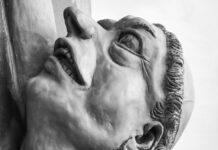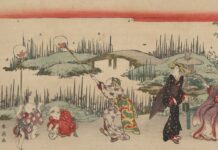The Improbable Wonders of Moojie Littleman
Book 2:
The Boy Who Killed Time
(An excerpt)
**
Prologue
I was asleep on my cot when a thumping sound woke me. I grasped my heart, yes, it was my heart. What a nightmare I was having!
There was a bird in a cage with a human face. I want to remember that part, to hang onto it forever. It was so real—the face was real. That of the girl I had loved and lost.
The cage was made of grape vines that were held together by slick, black rope.
Something; a cloud, a ghost, I don’t know what, came into the dream. It cast a wide shadow and hid her face. She flapped her wings violently. I felt her terror inside me.
I tried to open the cage to let her out. The ropes started moving. They were snakes. They struck my hand.—M.L. Notes from my journal, November, 1910
**
Part 1
Of Things Pertaining to the Current Size
of the Universe— 1910
Chapter 1
Continuing the trials of the valiant Moojie
Littleman, with dubious input from his loyal companion, Abu,
and other incidents worthy to be recorded by
the most worthy historian
The world has ended many times. Ask Moojie Littleman. Four years after the disaster of the century, he was riding his aging horse, Ulysses, over sand-covered ruins. It had occurred on the 18th day of April, one thousand, nine hundred and six years following the birth of Christ. He took into account Egypt’s Valley of the Kings, the blood-splattered Mayan pyramids, and the fertile Cradle of Civilization—cultures wiped out, scrubbed, reduced to ash. Maybe he survived the pandemonium for a reason. He liked to think so. After all, he had the word of a priestess who left the Earth in a swirl of light the world had never seen.
Moojie was sick with dread over an object he had lost. In the old days, such coins weren’t worth a red cent. Romans tossed them to beggars like breadcrumbs. But he valued it as much as his own life. He felt resentment, forced as he was to minister every Monday, rain or shine, happy or sad, sweet or sour. Marvel at his healing wonders and the demands of his practice. Ask him where it all got started, and he was known to show you this antediluvian medallion stamped with a ghostly male figure sporting a nimbus.
In the distance, motorcars and buggies shared the road, marking the divide between yesterday and tomorrow. Yesterday, San Miguel de las Gaviotas had been a beachfront fishing village of shacks built from shipwreck timbers that had washed to shore. An astronomical clock had towered over corrugated tins roofs and terracotta tiles, rippled and mottled as Stone Age artifacts. Tomorrow rang in the changing times: a town hall with a telephone, a bakery, Nickelodeon, and market, a general store specializing in livestock feed and fireworks, a cedar jailhouse with shingled rooftop. Clinging to superstition the way zealots cling to scripture, some residents of San Miguel and the Valley of Sorrows believed the 1906 pandemonium was the fiercest act of occult-retribution since the Indian Removal Act. One rancher in particular, Duncan McTavish, went so far as to claim that native ghosts had wreaked havoc from Purgatory in an effort to even the score. Of the survivors—some say the greatest survivor of all time—Moojie Littleman never believed a word of it.
It was like any other day in November—wan and misty. The sun never fully appeared, and the flat light made time stand still. Fog curled in on an easterly breeze, and the sun occluded San Miguel de las Gaviotas like a yellow cataract. Villagers were so isolated from the world that they got the latest news from newsreels at the Nickelodeon and old newspapers left on the train. And yet, every week modern life threatened to disrupt the troposphere of superstition. First it had been the horseless carriage, then the gyrocompass, then instant coffee. Never mind the scientific marvels, astronomical wonders, and wars of which the villagers never heard.
On this solemn day, Mrs. Latchkey, an aproned matron who possessed the long stringy limbs of an insect with a monumental thorax, was causing quite a stir outside her bakery. A crowd gathered as she tacked up a poster, and exclaimed, “He’s not a doctor, I assure you, not a priest. He’s a holy man!”
The tide was low. Four years prior, the pandemonium, which started as an earthquake and ended with a tidal wave, had devoured the former village. The residual rubble, beetle-bored timbers and a stairway leading nowhere, had the look of spit-out bones. Above the beach on a southern cliff stood the rustic chapel where Moojie had been abandoned as a baby. Sand, waves, the ghostly fog, and his horse’s plodding steps were all the company he could bear. Some wonder worker. He didn’t even know how to cure the ache in his own heart.
He pushed on, stubborn, hopeful, willing to do whatever it took to find the medallion.
Riding along the beach, he tied his shirt around his head like a sultan’s headscarf. His torso was sun-bronzed, his arms—the left, once intractable—well-hewn by ranch work. His abdomen was sunken, as if hungry with youth. He was listing to one side of the horse, eyes fixed on the ground. He simply had to find the medallion, his only link to Babylonia, the star child of his universe.
Moojie was a kind of cowboy-Romeo who contended with rivaling natures rather than feuding families. Human on one side, Light-Eater on the other, he was both mortal and immortal, a halfkin. It would seem to stem from the word half-breed, which meant offspring of parents of different racial origins. The similarity between halfkin and half-breed supposed that people could be identified accurately through racial lineage—identities, for all intents and purposes, that played an essential role in the sorting of land grants, scalps, and booty. However, the role of half-breed was more relative to the twentieth century because of the near extinction of racially mixed Natives who it meant to rub out. Halfkin, on the other hand, was a word unto itself, and must never be confused with the other. “It is yet to have its day in the English lexicon,” his friend, Abu, had said. “Once the world accepts the actual phenomenon, what better word to describe the offspring of two dimensions, such as you?” Abandoned as a baby, the Light-Eater priestess named Ninti had traced Moojie’s lineage to a European father and Light-Eater mother who had died during his birth. As a child, he had been called many names: hostile, Claw Hand, pea-brain. His adoptive mother, Kate, may she rest in peace, had referred to him as diffabled. But once he mastered his healing power, he abandoned his taut legs and cramped arm the way a tree outgrows its bark—only one example of his staggering abilities. In the isolated hamlet of San Miguel de las Gaviotas, this youth crowned with a dark, sun-streaked mop of hair, a scar on his right eyebrow that came as a result of a row, and a rare, infectious smile, was, quite honestly, something more than a healer, more of a wayshower, really, because his capabilities violated the laws of nature.
His dream that morning wasn’t just another carnival ride in his imagination, made surreal by its motion picture quality. It wasn’t just his mind. A cage held together by snakes. A bird with Babylonia’s face. A malevolent presence that sent her into a terror. It was a call for help! His thumping heart and the bird’s flapping wings had conspired to ring him up, like he was a radio or a telegraph receiver, all cable and wire.
The terrain appeared so monochromatic that nothing bore distinction. In order to focus he squinted his eyes.
But then—
Horse hooves came thundering up the beach behind him! An attacker raced past, ripping off his headscarf. “ATENCIÒN!!!” a male voice trumpeted. Moojie’s horse startled, nearly throwing him off.
The attacker whooshed past and vanished in the fog.
“Whoa boy! Whoa!” Moojie said, calming Ulysses.
The attacker circled back.
“You crazy toad!” Moojie said when he saw him.
They called him Abu. Like Zorro or Geronimo, he had only one name. Paunchy and stiff as a banker, his dirigible-shaped head and fig-colored lips gave him a certain charm.
“’Tis the job of your squire to keep you at the ready, is it not?” Abu said. He cut a theatrical shape in the landscape: knee-high boots, waisted vest, hat with feather, and leather gauntlets.
“You get paid for rakin’ poo, milkin’ goats, and mendin’ fences. No one said anything about playin’ Sancho Panza.”
“The heart of this unworthy slave pours out gratitude beyond measure. It is upon my honor that I would serve a wonder worker such as you, sahib.”
“You’ve been readin’ Don Quixote to Teresa, again.”
“Why, of course! For as long as I live, I will commit the knight-errant to memory, for you, sahib, are my Don. You cured me of a life-threatening condition!”
“It was a toothache,” Moojie said.
“I could have died! It was but one of your many wonders. I will never forget before… you know… when your legs were strapped in metal and leather, when you limped around on crutches. Then, that remarkable day… the day you walked alone for the first time, when you cured yourself of all cripplement… well, you might as well have walked on water!”
“It was a long time ago,” Moojie said, waving away flies. Moojie credited his success to Ninti, who had returned with the clan to their homeworld. Numbering twenty-one, the supernatural visitors had made pre-birth agreements to aid Earth’s evolution. He rarely spoke of them, because of the sorrow their memory stirred up. “I read in The Waltzing Lobster that before birth, they agree to a certain target age, that they are born like humans, but reach full maturity in three years.”
“Such is life in the Fifth Dimension,” Abu said. “One’s existence spirals through a core purpose, not bound by time.”
“There are three groups: olders are middle-aged up to whatever; youngers are school-agers; and handsome ones can be teenagers or young adults. Light-Eaters come in all genders. Some are men or women, some are manly women or womanly men, and some you can’t decipher.”
“The lobster book says unilaterals are highly valued,” Abu said.
Moojie explained that the parents of offspring who illustrated supernatural, or unilateral, gifts before three years of age sent them to live at the Temple of Sublime Joy in Uta, as soon as they could walk. There they cultivated gifts such as healing, clairvoyance, chanting, scroll-keeping, alchemy, mind-reading, and written languages. Babylonia and a youth named Sarru’kan had demonstrated clairvoyance and psycho-kinetic power at a young age. Ninti, their venerable teacher, later encouraged them to go into more specific studies. Babylonia chose to master her innate healing abilities, while Sarru’kan followed esoteric studies.
This Moojie had learned from Ninti.
“Anyhow,” Abu said, “Teresa is my most rapt student.”
“She’s a pigeon.”
Moojie continued searching the sand for the precious object. He looked at Abu, with equal parts of affection and aggravation. The two characters represented stark contrasts: Abu looked like Fatty Arbuckle. He was once a normal “chubby” but had doubled in girth. His appearance seemed even more absurd in comparison with Moojie’s rangy normalness, his body having lengthened and returned to full functioning four years ago. There were fourteen years of sub-normalness before that, when even the most basic activities, such as climbing a tree, were out of the question.
Abu shadowed him, looking left and right, as if he were the rearguard of a famous general. Ever since Moojie had healed him, Abu promised undying allegiance. He shaped this noble gratitude into theatrics that drove Moojie nuts. Moojie had no desire to sit on a pedestal, but Abu had taken the matter to melodramatic extremes. He made it a habit to ambush Moojie for his own good, to keep him on his toes, so to speak, to keep him safe from the “dark and stupid world.” Until recently, Moojie would have been amused. Normally, he would turn his horse around and chase Abu like a bandit, and once he caught up he’d take him to the ground in a vice lock, raise a knightly hand, and paste him.
But times had changed.
“You’re losing your touch,” Moojie had said the day before, after he won the horse race along the beach.
Subsequently, Abu rode up next to him. It galled him that he could never catch Moojie off guard. “You have the eyes of a wolf spider, sahib. All over your head,” he complained. “I am fierce. I am strong. I am deft as a wildcat. One day you will not be able to evade my pounce. One day my famed exploits will come to life, and some sage historian will recount my incomparable feats, and my face will be stamped on a coin. This I promise, oh sage enchanter!”
“No doubt,” Moojie said. He suspected Abu confused King Morpheus of Little Nemo in Slumberland comics with Don Quixote. All the same, Abu was a keeper of secrets. For one thing, Moojie had not been able to get out of this bookworm-dressed-like-a-shady-cigar-peddler why he knew how to get to Uta, Babylonia’s homeworld.”
Abu turned his nose northward like a compass needle, and sniffed. “Bread?! Be still, my gut, baked goods are calling from the village!” Abu was perpetually hungry, his whole heart and soul predisposed to his next meal, while lanky Moojie gave little thought to food. “I worry that you don’t eat enough, sahib. You are beginning to resemble a goat.”
Moojie was getting fed-up. Fed-up with Abu’s antics and bottomless pit of a stomach. The man was old enough to be Moojie’s grandfather, and yet he had the appetite of a teenage wolf. As he continued searching, Moojie muddled through his thoughts of ministry, family, family, ministry. Muddling so much, he had acquired a rash inside his brain. Stupid, stupid, stupid. He was so blessed. He had a calling, a family, a purpose. In truth, he woke sometimes in the night, resentful of the cost of these blessings. He was called a miracle worker. Penitents came to see him, describing all manner of sorrow and vexation—of mind, body, and pocketbook. He listened to their requests while his eyes seemed to be tracking the movement of clouds or the direction of the wind. He was there and then again he wasn’t there. People have said he conjured the fragrance of roses and manure. Penitents were cured, mostly. His father, Henry Littleman, a former mapmaker, who now handled the finances of St. Isidore’s Fainting Goat Dairy, always collected the required $2 donation. You couldn’t miss his presence, rapt and overhanging, taking coin like a trained crow. Auntie Tilda Pettibone, former Professor of Literature and Moojie’s deceased mother’s aunt, Queen of Perpetual Hand-Wringing, watched the door for freeloaders. Angst walked into that barn every Monday afternoon, souring the air with disease and tears and pettiness and pain of all varieties. Moojie suffered an assortment of aftereffects for his part in performing miracles—headaches and bellyaches, vertigo and weakness. His throat often tightened. If ever he complained, Henry and Tilda would accuse him of flagging faith and selfishness. It was his cross to bear. At night, he prayed to the angels. He opened his soul’s portal and light poured through him, immeasurable, cosmic. And he would be restored. Yes, he should have been grateful. How few had the power to do what he did?
The beach fog parted revealing a film set ahead. John Baird, a young director wearing a pork pie hat, vest, and red arm garter, barked stage directions through a megaphone while actors took their places. “Fear of God, people, fear of God!” While gas lamps still lit the streets of San Miguel, and the laws of Sir Isaac Newton still defined the universe, Baird was making black and white motion pictures on noteworthy discoveries, narrated with title cards and accompanied by piano.
Moojie veered away, staying on task.
Eighteen-year-old Moojie hadn’t looked at the sky for two years. He had not looked at anything, really, or strayed from his duties. More asleep than awake, he had been marking time, doing what was expected, praying, healing, sleeping dreamless. Better to comply with Henry and Auntie Tilda’s demands to bring in much-needed income for the dairy, than to dream of traveling. Since Babylonia and the Light-Eaters had left, Moojie’s hope for a reunion with them had ballooned and deflated. Even Babylonia’s memory was sinking under the payload of his longing. But his feelings for her were a labyrinth he had entered as a boy and never left. They met when he was eight. He was instantly spellbound. Her eyes were dark and endless as the night sky. He orbited her in wide ellipses, resisting the strange new anguish she caused, batting it across the creek as he would a rock. As he aged, he took more notice of her details: the slender, golden glister coming off her feet in the midday sun, her startlingly delicate ears and soft, dark wings for eyebrows. The intoxicating cave musk on her clothing. She once lowered her bodice to show him the symbol Emperor Constantine had tattooed between her shoulder blades to mark her as his. Goosebumps had risen from her skin to meet his trembling touch. Who could blame him? Moojie thought. I don’t want to let her go, either. He recalled the exact day, years later, when he professed his love to her: “The day I met you, it was like I fell asleep and woke up in a better world.”
This he told Abu, as they rode along the beach.
“At the time,” Moojie said, “it embarrassed me to think like that, to think of ownin’ a girl, like you would a kitten.” In his glimmering boyhood, Moojie had drowned in the fervor of his first crush, unable to sleep or eat. He skulked about with field glasses pretending to watch birds, taking every opportunity to study her from a distance, the interminable distance patrolled by his now-deceased grandfather, Captain Sean “Pappy” Finnegan, and the rival for Babylonia’s affections, Sarru’kan, Prince Charming of the Light-Eaters, the all-powerful progenitor of trouble. “Sarru’kan had it all planned out. He tried to get me to go to Uta, and to make Babylonia stay here with him,” Moojie said. “‘Together we’ll spawn a new nation of demigods,’” he said, mimicking Sarru’kan. “Ha! Lord Sarru’kan and his demon-worm, Nahzi, serpent spirit of the underworld. He met his match when I kicked his backside into the Circle of Trees.” Once inside, Sarru’kan couldn’t get out, for he was kept in the circle by an invisible force.
“And you did not go with them,” Abu said.
“The day of the pandemonium, my papa was in the village, alone, half-out of his mind with grief for Mama, broken. I had to help him.” Papa, Henry Littleman, was the father who left eight-year-old Moojie at St. Isidore’s “for a spell,” while traipsing off on a mapping expedition in the West Indies. One day, six years later, Moojie found out he had returned to San Miguel and never come to collect him from St. Isidore’s Fainting Goat Dairy in the Valley of Sorrows. That father. As much as it pained him, Moojie insisted that Babylonia return to Uta for her own safety. “Ever since that day, I’ve questioned that decision,” Moojie said. At the time, San Miguel de las Gaviotas was a gem with too many facets. The villagers did not know how to define “We, the people.” That the Light-Eaters were dark-skinned was a first strike against them. That they resembled Native Americans, a second. Since they were not confined to a reservation, the locals assumed they were renegades, and that meant they could be shot on sight, no questions asked. Clearly, Babylonia loved Moojie, and clearly she would never be safe.
Moojie had committed to memory the last time he saw her. It was the morning of the pandemonium, high on El Serrat Mountain. Before she left, Babylonia turned back to say, “Abu knows how to find me.” After local bounty hunters stood by helplessly with their loaded weapons, Moojie watched her and the Light-Eaters vanish in a flash of light, through the sky portal above the Circle of Trees. WHOOSH! A short time later, wild irises everywhere–on the mountain, in the woods, along the fences of St. Isidore’s– released glowing spores of light. They floated upward through the early morning darkness, in silent procession, gathering in the trees. That night, so many spores rose to meet the stars that goats fainted and horses neighed, as if the beauty were unbearable.
Images of that time were disappearing like sand under Moojie’s feet. While he remembered nearly everything Ninti had said concerning his initiation and the Light-Eater’s Code, her words were like pearls rubbing against the folds of his brain. Feed the poor. Make peace with your enemies. He had risked life and limb in order to prove he could follow the Code, and what did he have to show for it? A little more humility, maybe. Close to nothing. Since then, he had been willing to do what was expected of him, afraid to disturb the fragile balance of the only family he had ever known.
Until last night.
Until The Dream.
About the Author
Robin Gregory is an American screenwriter and novelist who describes her work as magical realism. Her début novel, Book One of an upcoming trilogy, The Improbable Wonders of Moojie Littleman, won Best Books of the Year from Kirkus Reviews, IPPY, Gelett Burgess, and more. Available in English and Simplified Chinese translation. Book Two: The Boy Who Killed Time, will be released in 2020. Her non-fiction work has appeared in Ginosko Literary Journal. She studied Literature and Creative Writing at the University of California, Santa Cruz, and Stanford Writer’s Workshop. She lives in California with her husband and son.
















